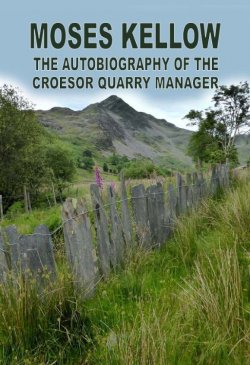Moses Kellow: The Autobiography of the Croesor Quarry Manager
Moses Kellow: The Autobiography of the Croesor Quarry Manager edited by Cathy Woodhead
Moses Kellow (1862 – 1943) was the Manager of Croesor Quarry from the mid 1890s until its closure in 1930. He is famous for his remarkable engineering achievements including the hydraulic Kellow drill, and introducing three-phase hydro-generated electricity into the quarry works. After going blind at the age of 80, he dictated his autobiography giving a unique insight into this very strong-minded individual and his views on many topics. £10.00


The autobiography, rather than being a chronological account, consists of a number of episodes from Kellow’s life plus his reflections on various topics. He describes his intellectual and technical successes (Kellow not being one to hide his light under a bushel) plus his reflections on religion, his improvements to the fuel consumption of his car, his health, travels in America and Europe (with observations, generally unfavourable, on continental hotel staff), experiences in local politics and as a county councillor and accounts of various misfortunes and near accidents, both in and outside the quarries, that befell him. Overall, Kellow comes across as an intelligent, able, well-informed and thoroughly remarkable man, albeit opinionated. However, he was obviously not without humour, and has the grace at one point to describe his autobiography as a ‘somewhat haphazard account of [his] life and activities’.
From the industrial and particularly mining history perspective, the sections of most interest are obviously Kellow’s activities relating to slate quarrying and especially his accounts of the provision and use of electricity at Croesor Quarry and the development of the Kellow drill. However, his autobiography also provides a fascinating view of life in and around the quarrying industry in north-west Wales from the later part of the nineteenth century to the years preceding the Second World War.
Kellow’s autobiography was originally published in instalments in the Quarry Managers’ Journal in 1944–5. This edition has been produced from WMS member Adrian Barrell’s transcription of those instalments. Providing context is a foreword by Adrian and nine appendices which include poems by Kellow, his applications for membership to the institutions of Civil Engineers (1903) and Mechanical Engineers (1913), obituaries and details of the inscription on his grave, details of his wills, information about Kellow’s family and oral recollections of Kellow collected by Adrian.
Although Kellow’s autobiography is available both as originally published and in Adrian Barrell’s transcription deposited in some reference libraries, this excellent and well-produced book makes Kellow’s life story and the valuable supporting material by Adrian available to the wider public. I whole-heartedly recommend it.